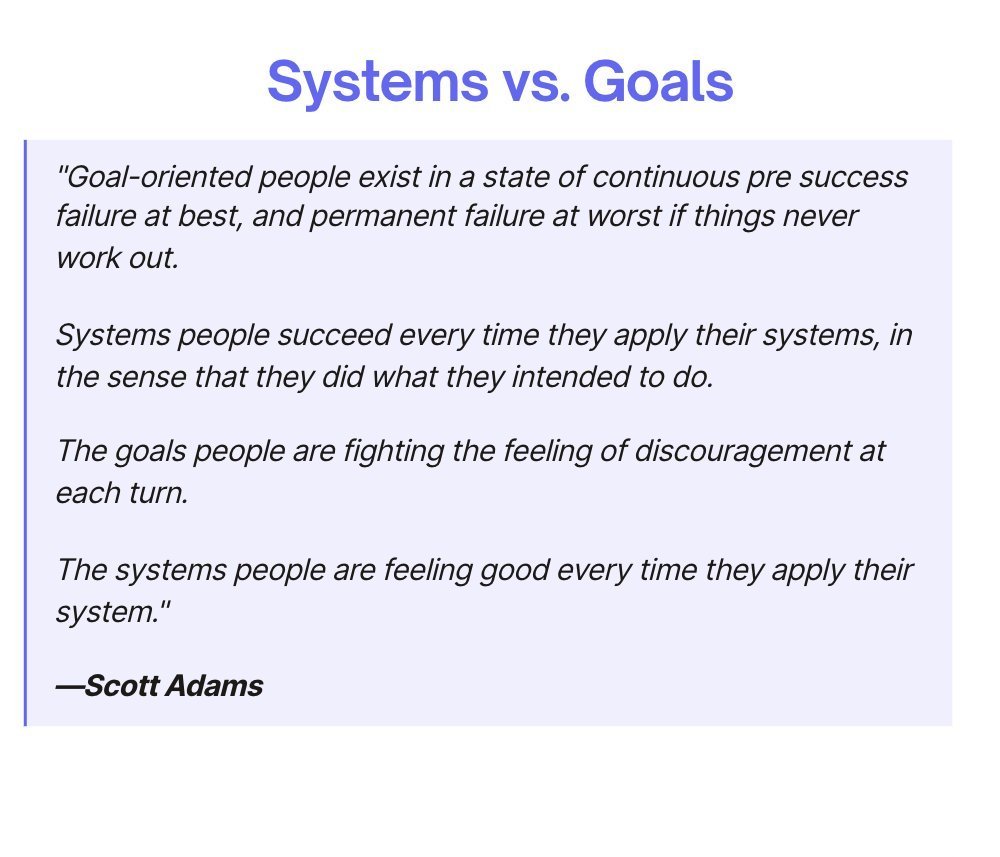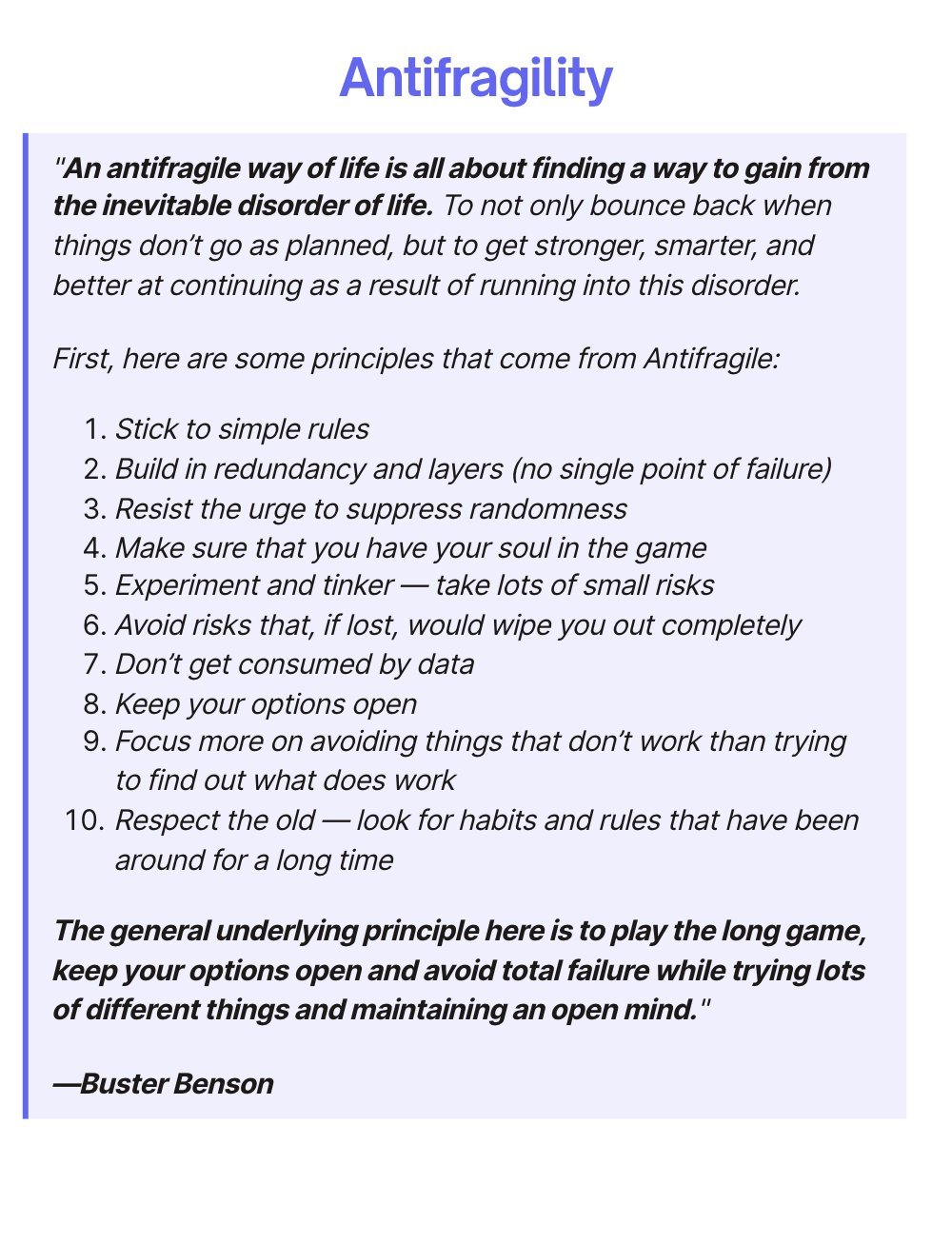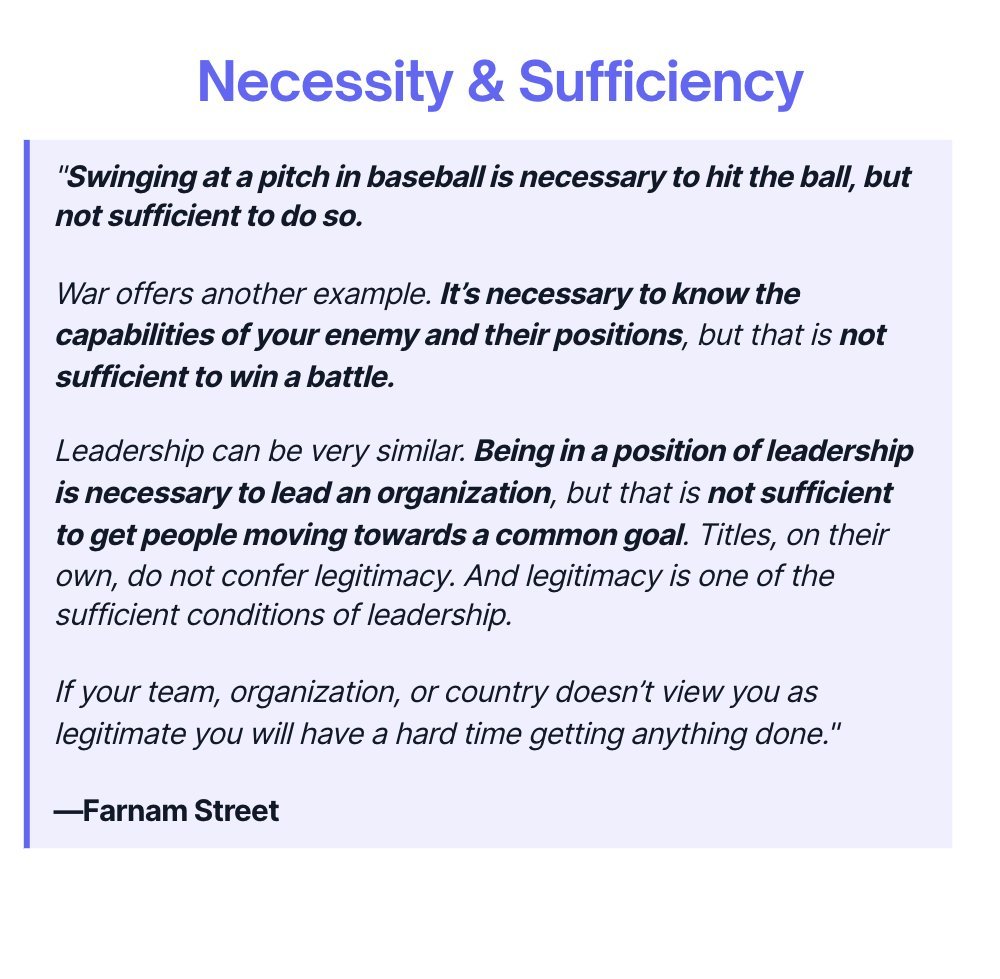Thread
10 mental concepts that will make you way smarter:
Systems vs. Goals
To achieve more, focus on the process first—the system—that will get you to the goal.
Doing something every day is a system—like writing for 1 hour.
Writing a book is a goal.
"Goals determine your direction. Systems determine your progress.”
—James Clear
To achieve more, focus on the process first—the system—that will get you to the goal.
Doing something every day is a system—like writing for 1 hour.
Writing a book is a goal.
"Goals determine your direction. Systems determine your progress.”
—James Clear
Antifragility
Antifragility is benefitting from disorder, change, or unexpected events.
The things that have survived the longest in the universe have an antifragile system in place—the things that haven’t, don’t.
To succeed long-term, we should strive to be antifragile.
Antifragility is benefitting from disorder, change, or unexpected events.
The things that have survived the longest in the universe have an antifragile system in place—the things that haven’t, don’t.
To succeed long-term, we should strive to be antifragile.
Necessity & Sufficiency
A necessity is something you must have to achieve an outcome.
Sufficiency is what you actually need to achieve the outcome.
Necessary conditions must be present, but on their own, aren’t enough for achievement.
A necessity is something you must have to achieve an outcome.
Sufficiency is what you actually need to achieve the outcome.
Necessary conditions must be present, but on their own, aren’t enough for achievement.
Table Selection
The game you play—or the table you select—is more important than how you play.
You don’t need to get good at doing difficult things if you get good at avoiding difficult things.
If you want to win, pick an easy table and nail your execution.
The game you play—or the table you select—is more important than how you play.
You don’t need to get good at doing difficult things if you get good at avoiding difficult things.
If you want to win, pick an easy table and nail your execution.
Backwards Law
The more you pursue feeling better all the time, the less satisfied you become, as pursuing something only reinforces the fact that you lack it in the first place.
Wanting what you have is as good as having what you want.
—Alan Watts
The more you pursue feeling better all the time, the less satisfied you become, as pursuing something only reinforces the fact that you lack it in the first place.
Wanting what you have is as good as having what you want.
—Alan Watts
The 10:10:10 Strategy
Before making a decision, ask:
How will I feel 10 minutes from now?
10 hours from now?
10 days from now?
This will force you to think about the longer-term impact of what's facing you.
Don’t make decisions based on immediate gratification.
Before making a decision, ask:
How will I feel 10 minutes from now?
10 hours from now?
10 days from now?
This will force you to think about the longer-term impact of what's facing you.
Don’t make decisions based on immediate gratification.
Stress + Rest = Growth
To grow you must do two things:
1. Challenge and push yourself—feel the burn.
2. Relax and give yourself time to recover.
Constant stress without rest is a recipe for burnout.
Relaxation without stress will leave you nowhere.
@BStulberg
To grow you must do two things:
1. Challenge and push yourself—feel the burn.
2. Relax and give yourself time to recover.
Constant stress without rest is a recipe for burnout.
Relaxation without stress will leave you nowhere.
@BStulberg
Wrong-Side-of-Maybe Fallacy
People judge the same way: they look at which side of “maybe”—50%—the probability was on.
If the forecast said there was a 70% chance of rain and it rains, people think the forecast was right; if it doesn’t rain, they think it was wrong.
@PTetlock
People judge the same way: they look at which side of “maybe”—50%—the probability was on.
If the forecast said there was a 70% chance of rain and it rains, people think the forecast was right; if it doesn’t rain, they think it was wrong.
@PTetlock
Introspection Illusion
We think we understand our motivations and desires, our likes and dislikes.
We believe we know ourselves and why we are the way we are.
In reality, when asked to explain our emotional states, we typically make something up.
Dig deeper, reflect more.
We think we understand our motivations and desires, our likes and dislikes.
We believe we know ourselves and why we are the way we are.
In reality, when asked to explain our emotional states, we typically make something up.
Dig deeper, reflect more.
Gambler's Fallacy
We think future possibilities are affected by past events.
You've lost 9 in a row, but you're sure to win the next one!
You've won 9 in a row, how could you possibly lose the next one?!
Lesson: Treat each possibility independent of the past.
We think future possibilities are affected by past events.
You've lost 9 in a row, but you're sure to win the next one!
You've won 9 in a row, how could you possibly lose the next one?!
Lesson: Treat each possibility independent of the past.
TL;DR —
1. Systems vs. Goals
2. Antifragility
3. Necessity & Sufficiency
4. Table Selection
5. Backwards Law
6. The 10:10:10 Strategy
7. Stress + Rest = Growth
8. Wrong-Side-of-Maybe Fallacy
9. Introspection Illusion
10. Gambler's Fallacy
1. Systems vs. Goals
2. Antifragility
3. Necessity & Sufficiency
4. Table Selection
5. Backwards Law
6. The 10:10:10 Strategy
7. Stress + Rest = Growth
8. Wrong-Side-of-Maybe Fallacy
9. Introspection Illusion
10. Gambler's Fallacy
P.S. — Interested in becoming a multidisciplinary thinker?
The Latticework is an application-only community that teaches the big ideas from the big disciplines.
I've been a member for 1 year and am now offering my community priority access to join:
ltcwrk.com/alex-brogan-ltcwrk/
The Latticework is an application-only community that teaches the big ideas from the big disciplines.
I've been a member for 1 year and am now offering my community priority access to join:
ltcwrk.com/alex-brogan-ltcwrk/
That's a wrap!
Follow me @_alexbrogan for more thought-provoking content to help you get better at the game of life.
Follow me @_alexbrogan for more thought-provoking content to help you get better at the game of life.


